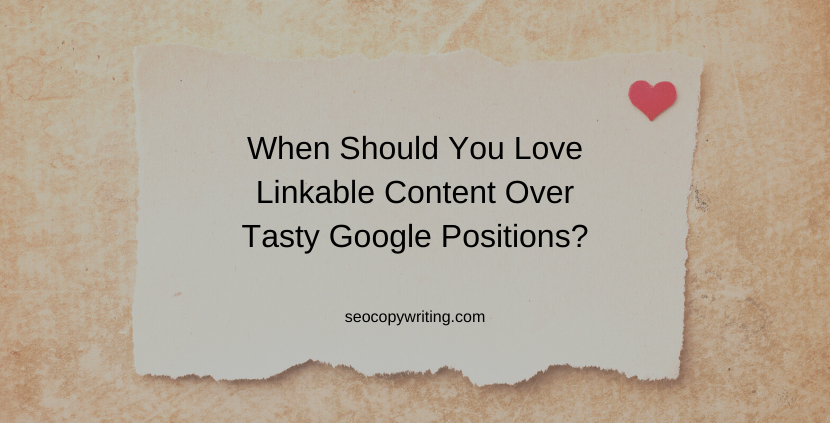When Should You Love Linkable Content Over Tasty Google Positions?
Let’s play a game.
Let’s say you had a choice…
— You could create a piece of content that drives lots of incoming links — but, it will never position in Google.
— Or, you could create a top-positioned piece of content — but it will never receive an incoming link.
Which option would you choose? And why?
(Tricky, isn’t it?)
This question was the basis of a great blog post by Page One Power. The author asked 20 SEO experts what they would choose — linkable or keyword-rich content. You can read their responses here.
After reading the article, I had to think about my answer. My knee-jerk reaction was to immediately scream, “Of COURSE keyphrases are more important!”
But, I know that’s not always the case. In fact, there are advantages to both linkable and keyphrase-rich writing.
(Yes, the SEO writing expert sees a time when SEO writing best practices can take a back seat. Amazing, I know!)
Let’s talk about when writing “linkable” content is the better strategy.
Back in the day, companies got “internet famous” for creating huge, state-of-the-industry white papers and reports. For instance, one company reviewed the top e-commerce firms and wrote a report showcasing their missed SEO opportunities.
The report was huge. It got the company press mentions, links, speaking opportunities — and most likely, millions of dollars in business.
Why? Because the report hit a pain point. It showed major retailers what they were doing wrong and demonstrated how there was a better way.
I doubt people back then were Googling, “how to make my e-commerce site’s rankings better” — but they sure paid attention when the report got major press.
That’s pretty cool.
This strategy still works today. In fact, I discussed it in my post “Here’s How a New Site Can Make a Big Splash.
It’s hard to get content assets to position for a brand-new site. But, if you create a new “state-of-the-industry report” that gets great buzz. BOOM! Your report can put you on your target audience’s radar pretty quickly.
And, build authority and links, too.
To summarize, writing for links is a viable strategy if:
— You have a new site, and you have a content idea you know your readers will love. (As a tip, stirring up controversy tends to work well.)
— You’re interested in receiving a lot of general traffic.
— You’re not writing a money-making page (like a services page.)
When is writing keyphrase-optimized content the smart strategy?
As Danny Goodwin said in the article, “SEO is about driving the right kinds of traffic and helping your business succeed.” When people are searching for the information (or services or products) you offer, they’re going to Google and are typing keywords into the search box.
Why wouldn’t you want your brand to be front-and-center every time someone conducts a Google search for your main keyterms?
Top-positioned blog posts may not always sell product, but wow, can they position. For instance, I’ve shared this REI example multiple times — this one page positions for hundreds of keywords.
Even if just a small percentage of their visitors purchase a product, it makes all their optimization efforts worth it.
To summarize, optimized content is a viable strategy if:
— Well, pretty much all the time. Optimized content drives highly specific traffic to your site. And, if you’ve done a good job writing for your reader, your optimized content should drive links.
Which is the perfect best-of-both-worlds situation.
So yes, ignore keyphrases if it makes sense — but know that your writing needs to be spectacular (with a fantastic hook) to get the viral and link love you want.
Otherwise, you’ll create an expensive content asset that won’t position, drive links, or make you money.
Ain’t nobody has time for that.
But Heather, what would you do — create content that is linkable or keyphrase-rich?
Do you really even need to ask? :)
My personal opinion after thinking about this way too much — if the content was important from a business perspective, I’d default to SEO writing best practices every time. Even if it didn’t drive a single link, I’d rather have my content be front-and-center when someone Googled a relevant question.
I love tasty incoming links, but positions (and Google branding) is where I focus.
Sure, there are some times that I write something, and I don’t care if it positions. Maybe it’s a more rant-y post or one that’s more personal. In that case, I’m making a conscious decision to let SEO go…which is different than ignoring the opportunity.
What do you think?
When would you write “linkable” content over something that’s keyphrase-rich? Leave a commen tand let me know.




Great write-up here Heather. Since the first day I came to your blog, its been freebies worth hundreds of dollars from you and I’ve learnt another great deal in this post again. Subs means alot
Yay! Thank you so much!
This question always troubled me when I got into SEO. It still kinda does but this article helped clear a lot of my doubts.
Thank you so much, Heather!!
Great article. As always! I’m about to start working on a blog on my website and although someone else will be producing it for us, this article will be a great help to make sure that we’re on the right track to creating successful, engaging content. Thanks